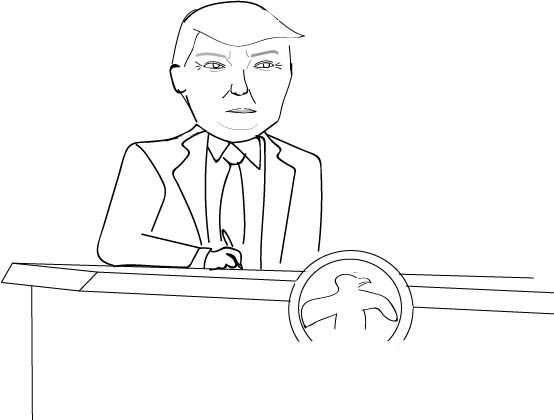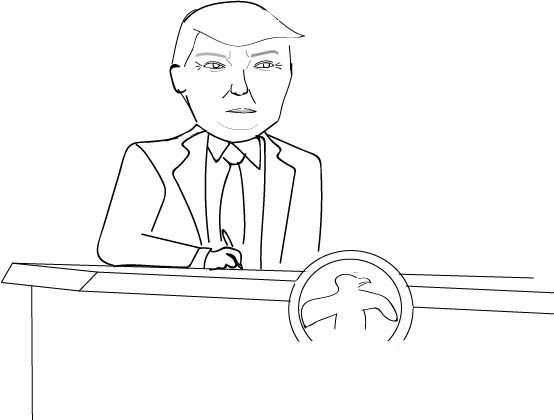By Amelie Zilber ’20, David Arkow ’20, and Jessa Glassman ’20

Left
By Amelie Zilber ’20
Armies of resistance are massed in the streets, representing a motif of opportunity for passionate Democrats optimistic towards change in this drastic, new political era of President Donald Trump.
In a brief span of 30 days, Trump dove head first into an explosion of executive orders in an attempt to deliver his unmistakably far-fetched campaign promises. Having passed 12 executive orders within three weeks, American policies on climate change, public safety and immigration have shifted, alongside our deep rooted American values.
A few short months ago, America was labeled a front runner in global climate change, launching a transitional period towards becoming a nation providing aid in our planet’s preservation. But, little to our surprise, for Trump deems climate change a hoax created by the Chinese, our nation has retreated towards an age of traditionalist conservatism. In a swift, thoughtless process, President Trump ordered the re-authorization and rapid completion of the Dakota Access and the Keystone XL pipelines, two controversial infrastructure projects allowing for easier transportation of fossil fuels across North America. This contentious move fulfills Trump’s “Day One” promise of weakening the regulatory procedures in place blocking the pipelines. Not only have we seen his cabinet become occupied by the most extreme hard-right ideological, fossil fuel-oriented appointments in history, we have seen that environmental conservation falls low on his bar of critical issues.
Secondly, Trump signed a series of orders seeking to abolish sanctuary cities in the U.S., and to ensure jurisdictions are made solely to enforce federal immigration law. Trump released an executive order supporting immigration enforcement and encouraging punishment of local governments failing to comply with federal authorities. Sanctuary cities in the U.S. are places in which local law enforcement policies restrict the persecution of undocumented immigrants to federal authorities. Immigration was a central pillar in Trump’s campaign, for he gave off the notion that American crime and violence arose through the residency of immigrants. Despite statistics showing the drastically decreasing probability of immigrant-based crime in the U.S., Trump’s hardline position on immigration deportation deeply resonated with conservative voters.
In November 2015, the Islamic State mounted devastating attacks in Paris, gunning down more than a hundred people at a rock concert, in restaurants and outside a soccer stadium. In response, Trump fulminated about his future radical measures imposed on Muslims seeking to enter the United States if elected. To what came as a disappointing shock, even though Trump emphasized his disposition on key order during his campaign, the nightmarish initiatives employed for political advantage to “Make America Great Again” became a reality. Through his nativism and aggression, Trump represents a new form of Republican: extreme radicalism. His new ban on immigration fundamentally conflicts with America’s long-standing values, extremely undermining our country’s economic dynamism and ability to harness the talent and dire need of immigrant workers.
America stands as a beacon to the world as a refuge for the tired, the poor, the huddled masses yearning to breathe free. Trump, after failing to win the popular vote, has acquired no mandate for his actions, and he is steamrolling through a surfeit of unconstitutional executive orders.
Right
By David Arkow ’20
While just one month into the Trump Presidency, he has taken action to his promise of bringing real change to our country by passing many executive orders. Some are minor such as declaring a Day of Patriotic Devotion (Jan. 20), but others are major including reversals of some of former President Barack Obama’s policies (Dakota Access and Keystone Pipeline and regulatory burdens) and the heavily debated travel ban. Rarely has a president issued this many executive orders in his first month, which leaves some questioning as to whether these executive actions are warranted.
An executive order is an order issued by the president that has the force of law. Trump is doing exactly what voters wanted him to do, which is bringing real change to the country. Many Americans, both Democrats and Republicans, are dissatisfied with Washington politics and Congress, and Trump is the antidote. He is using his power as president to act as a leader. The number of executive orders will slow, but Trump will be one of the most active presidents to exercise executive power. With all of the protests across the country, many are only aware of the drawbacks of Trump’s executive orders. However, it is important that people are informed about the orders and how they are intended to benefit the country.
Trump’s most heavily debated action so far is Executive Order 13769, or as it is more commonly known, The Muslim Ban. Currently, it is inactive as it was blocked by federal judge James Robart. However, his role is only to decide if the order is protected by the Constitution and federal law, not to judge on policy. Trump appealed the decision, but the appellate court did not reinstate the travel ban. The executive order is not a “Muslim Ban” as the media has defined it. It is a temporary halt for 90 days on people entering the U.S. from seven middle eastern countries identified by the Obama administration as “countries of concern.” Trump tweeted that the purpose of the temporary travel ban is “about keeping bad people (with bad intentions) out of our country.” The order’s title is “Protecting the Nation From Foreign Terrorist Entry Into The United States.” Its goal is to protect American citizens from foreign terrorists. The large majority of people from these countries are not a threat to national security, but there are a small number who may try to enter the United States from ISIS.
The executive action is viewed as an “anti-Muslim policy,” but it should be viewed as an isolationist policy. We know that from Trump’s foreign policy, trade and immigration views, that he is an isolationist, or as he calls it, “America First.” Past presidents have imposed temporary immigration bans including former President Jimmy Carter who blocked Iranians from entering after Americans were held hostage there. Under Obama, the State Department stopped processing Iraqi refugee applications in 2011 for six months after they learned that Iraqi terrorists infiltrated the U.S. through the refugee program. Trump’s ban is not very different from past ones; it is just on a broader scale. While the travel ban has some flaws, as it is over-inclusive and includes legal immigrants, it can be modified to better accomplish its goal. The executive order also gives preference to religious minorities in these seven countries, mainly Christians. The Christians in these countries are persecuted the most and have the hardest time getting out of the refugee camps. Overall Trump’s travel ban is not perfect, but will improve national security, putting “America first.”
Center
By Jessa Glassman ’20
Donald Trump, the 45th president of the United States, has been exercising his executive power and passing policies that have been widely contested. This power takes the form of executive orders and therefore allows him to bypass the other branches of government in order to take an action.
Executive action is a very controversial topic, especially now during the beginning of the presidency of the least favorable man to take office in our nation’s history. Because it functions off of one person’s ideas, it often faces criticism because there are bound to be people who disagree and also because it overlooks the other two branches of government and gives ultimate power to the president. Questions arise about whether or not this is democratic, but those are typically rooted in personal opinion. People who agree with the president and his executive action are likely not to oppose the system of executive power.
It is obvious that Trump hit the ground running right when he got into office. Trump was the first man since President Bill Clinton to sign an order on his first day of work, and he has been continuing in the pattern of taking the actions he deems necessary in a quick fashion. While many people say that Trump has been abusing his power, he has been putting forth a similar number of orders as previous presidents. This claim has been circling the nation because of the magnitude and the fact that many of his actions have been opposed.
No matter the number of executive actions he has taken, the important thing that citizens should hold a magnifying glass up to is their intentions and content. A very controversial executive order that has received lots of attention is the so-called “Muslim Ban,” created to temporarily halt the entry of citizens from seven majorly islamic countries chosen by President Barack Obama as “terrorist threats.” The order has created much confusion not only in the U.S., but also throughout the world because of its vagueness. The travel ban has been challenged by many political figures as well as everyday citizens because of the controversy. Both parties would disagree over whether this action is the right one to take, however, it is of the utmost importance that we continue to respect the democratic system that our country has been thriving off of for more than 200 years. If an action is disputed, citizens should talk to their local government officials or find another way to get involved rather than bashing the executive order system. Executive orders are a significant piece of our governmental system, and while it is obvious that this can be abused, focusing on the content of the orders rather than the system as a whole is the right way to go about critiquing executive order.




